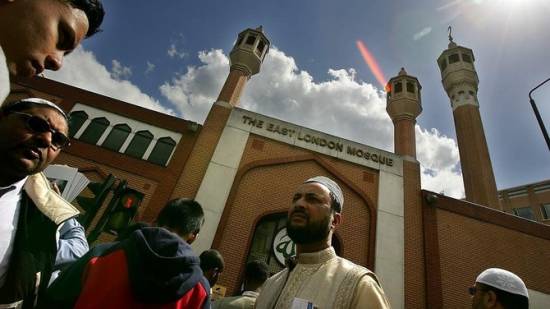- 25.9% of Britons feel negatively toward them, 18.1% support banning Muslim immigration
- ‘Islamophobia remains one of the most acceptable forms of racism,’ expert tells Arab News
LONDON: Muslims are the second “least-liked” group in the UK, according to a new study that reveals the shocking extent of Islamophobia in the country.
The study, by researchers at the University of Birmingham, found that roughly one in four Britons hold negative views of Muslims and Islam — the highest of any group apart from gypsies and Irish travelers.
Over a quarter of people — 25.9 percent — feel negatively toward Muslims, and just under 10 percent feel “very negative.”
Significantly more Britons hold negative views of Islam in the survey of 1,667 people than they do of other religions.
That translates into much higher support for a hypothetical policy that bars all Muslim migration to Britain.
Nearly one in five people — 18.1 percent — support banning all Muslim migration to the UK, and 9.5 percent “strongly support” that idea.
The study found that Britons are very willing to pass judgment on Islam, but are extremely unlikely to have any real knowledge of the religion.
“British people acknowledge their ignorance of most non-Christian religions, with a majority stating they are ‘not sure’ how Jewish (50.8 percent) and Sikh (62.7 percent) scriptures are taught,” said the study.
“In the case of Islam, however, people feel more confident making a judgment, with only 40.7 percent being unsure. This is despite the fact that people are much more likely to make the incorrect assumption that Islam is ‘totally’ literalistic.”
This finding — that Britons know less about Islam but are more willing to pass judgment on the faith — “says something about how prejudice works,” Dr. Stephen Jones, author of the study and a researcher focusing on British Muslims, told Arab News.
“We tend to associate prejudice with ignorance, but that’s too simple. Instead, prejudice is a kind of miseducation: Many people in this country think they know what Islam is about, and what Muslims believe, in a way that they admit they don’t for other non-Christian religions.”
Islamophobia is so widespread in Britain, Jones said, that it has become socially acceptable. That is why the report dubs it “the dinner table prejudice” — because people will openly and freely admit to their anti-Muslim prejudice, in a way that they are unlikely to with other religious or ethnic groups.
Jones said: “What I think surveys like this into public attitudes tell us is that not only do Muslims suffer discrimination, but that public hostility toward Muslims is on some level publicly accepted. It’s not just that Muslims suffer from Islamophobia, but that this discrimination isn’t publicly recognized.”
The research makes a series of policy recommendations to address the prevalence of Islamophobia in the UK, including acknowledging that “systemic miseducation about Islam is common in British society and forms an important element of Islamophobia.”
It added: “Government and other public figures should publicly acknowledge and address the lack of public criticism that Islamophobic discourses and practices trigger.”
The report lands at a sensitive time for the ruling Conservative Party, with former Cabinet Minister Nusrat Ghani announcing that she was removed from her position because her “Muslimness” made her colleagues uncomfortable.
Prime Minister Boris Johnson has ordered an inquiry into her removal, but he has himself previously faced accusations of Islamophobia, including by comparing women who wear the niqab to “letterboxes.”
Shaista Aziz, an anti-racism and equalities campaigner, told Arab News: “Islamophobia is anti-Muslim racism and it has deep-seated and historic roots in the UK. Yet Islamophobia continues to be denied as a form of racism by many across all spheres of society, including in politics, the media and academia.”
She added: “This report provides further nuanced evidence of how pernicious and mainstream Islamophobia is, and how those in power are refusing to recognize this racism.
“Islamophobia remains one of the most acceptable forms of racism, and one that overwhelmingly remains overlooked, denied and unchallenged.”/AN


